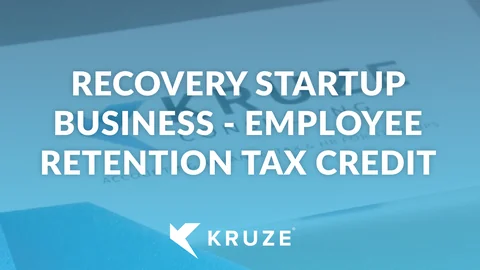
Companies founded after February 15th, 2020, are likely eligible for a special form of employee retention tax credits (ERC or ERTC’s). These businesses are called “Recovery Startup Businesses’’ in the context of employee retention tax credits.
Now that’s a mouthful, but it’s actually really important for your startup, especially if your company was incorporated or founded after February 15th, 2020. The American Rescue Plan Act of 2021, acknowledges that starting a company during COVID was difficult, and this attempts to help those companies with their cash flow. Specially, the government will give “recovery startups” tax credits to help them hire by making hiring new people cheaper.
Qualification tests for recovery startups and employee retention tax credits
There are a couple tests to make sure that your startup is eligible as a recovery startup for these ERC. The first one was the business started on or after February 15th, 2020. Basically when COVID hit the United States. The second one is the company must have had an average of $1 million or less in gross receipts every year.
If your company was started in 2020 and you are filing for this in 2021, you’re basically just looking at the 2020 year. Did your company do less than a million dollars in gross receipts / revenue in 2020? And for most startups except for the just ginormous rocket ships, they’re all going to be able to answer yes. They’re going to qualify for that because it’s very rare that a company can do a million dollars in revenue in its first nine or ten months of operation.
How much can a recovery startup get with the ERC?
So the good news here is your startup can save basically $7,000 per employee on a tax credit, assuming they pay at least $10,000 or more to that employee in the eligible time periods.
It’s capped at $50,000 per quarter. So $50,000 in Q3, $50,000 in Q4, 2021. So basically you need about seven or eight employees to, and assuming you’re paying typical startup engineering wages, you will max out at $50K per quarter in credits. So you’re looking at $100,000 tax credit on payroll taxes over the two quarters.
How to claim ERCs if you are a recently founded startup
The way you claim that is to work with your payroll provider and your friendly startup CPA firm, Kruze Consulting, to make sure you’re eligible and actually go through a questionnaire. Then your CPA can walk you through the process that you’ll use in your payroll provider to claim the credit (our team has been doing Zoom share screens to help our clients walk through the process with Gusto, Rippling and other popular payroll providers.)
Providers like Rippling, Gusto, Justworks, TriNet, have really good workflows for this. And you will answer the questions in the payroll system’s site. Again, questions like “did you start after February 15th, 2020. Did you do less than a million dollars in average revenue?” And a couple more questions, and then they will actually enable your company to have the tax credit. So it’s actually really slick. Shout out to our payroll provider relationships for doing a great job, putting this into their software very quickly and shout out to the Biden administration and Congress for putting this act into place.
At Kruze we have hundreds of companies that actually qualify for this, so it’s pretty exciting. But it’s also a little overwhelming, it’s a lot of work, but we’re happy to do it and love helping our companies. So just remember if your company was started after February 15th, 2020, you are probably eligible for the recovery startup business portion of the employee tax credit. And just reach out to your CPA firm.
FAQs
What is a Recovery Startup Business ERTC?
In order to meet the definition of a “Recovery Startup Businesses’’ in the context of employee retention tax credits, as authorized by the US Congress, a company must have 1) been founded after Feb 15, 2020; and 2) also have less than $1 million in revenue. Consult with your CPA for more details.
Are new companies eligible for employee retention tax credits?
Yes. In 2021, Congress passed new legislation that let “recovery startups” - ones founded after Feb 15, 2020, to claim the Employee Retention Credit (ERC). The company must also have less than $1 million in revenue.
What’s the maximum amount of ERC for a recovery startup?
Congress/the IRS have capped the ERC for recovery startups at $50,000 per quarter. With two quarters to apply these credits, that’s $50,000 in Q3, $50,000 in Q4, 2021. So you’re looking at $100,000 tax credit on payroll taxes over the two quarters, assuming you have seven or eight engineering employees making typical silicon valley wages.
How does a Recovery Startup apply for an ERC?
The best way to let the IRS and Federal Government know that you are claiming the ERC is to work with your payroll provider and your CPA firm. Providers like Rippling, Gusto, Justworks, TriNet, actually have really good workflows for applying for the ERC.











